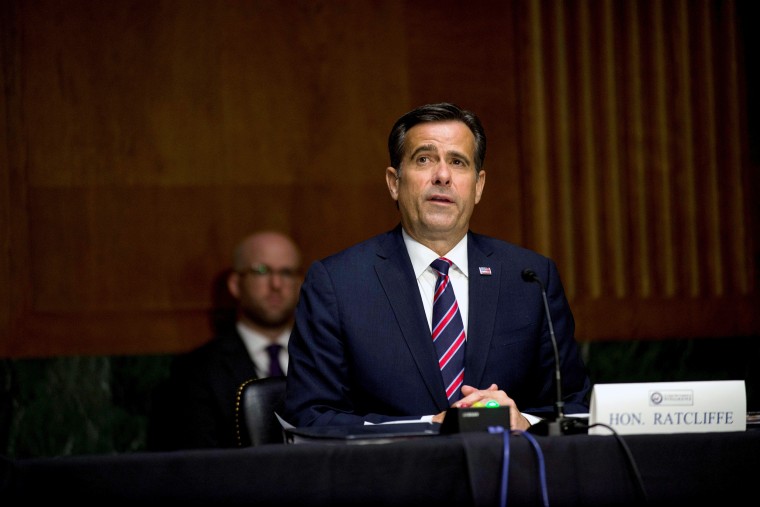Director of National Intelligence John Ratcliffe delivered strange public remarks last week, alerting the public to alleged Iranian antics, targeting Democratic voters in multiple states. The DNI, however, said Tehran's tactics were intended to "damage President Trump," which didn't seem to make any sense.
And now we know why. Politico reported late yesterday that Ratcliffe "went off script" during his remarks.
The reference to Trump was not in Ratcliffe's prepared remarks about the foreign election interference, as shown to and signed off by FBI Director Chris Wray and senior DHS official Chris Krebs, the director of the department's Cybersecurity and Infrastructure Agency. Wray and Krebs stood behind Ratcliffe as he addressed the public, supportive of the general intention to alert voters to a malicious influence operation. But they were surprised by Ractliffe's political aside, which had not appeared in the prepared text, the officials said.
Or put another way, if the reporting is correct, the director of National Intelligence, while reading from prepared text, warning the public about a voter-intimidation scheme, decided to just ad-lib a line -- which happened to be designed to benefit the president during his re-election campaign.
Charitable observers might conclude that Ratcliffe made a simple mistake, but given the circumstances, it's awfully difficult to give the DNI the benefit of the doubt. Despite assuring senators during his confirmation hearings over the summer that he would be "entirely apolitical," the New York Times reported earlier this month that the opposite has been true.
He has approved selective declassifications of intelligence that aim to score political points, left Democratic lawmakers out of briefings, accused congressional opponents of leaks, offered Republican operatives top spots in his headquarters and made public assertions that contradicted professional intelligence assessments. None of the moves have dismayed his critics, or intelligence officials inside the C.I.A. and the National Security Agency, as much as Mr. Ratcliffe's decision to release unverified intelligence last week that mentioned Hillary Clinton.
About a week after that article was published, Ratcliffe appeared on Fox Business and made on-air comments that extended election support to the president -- which is definitely not his job.
His efforts have not gone unnoticed. Michael Morell, who served as deputy director of the CIA, and Mike Vickers, who served as undersecretary of defense for intelligence, wrote a rather brutal op-ed for the Washington Post two weeks ago, urging the DNI to resign. Ratcliffe, they wrote, is responsible for "undertaking the most blatant and egregious politicization of intelligence" in recent memory.
Last week, in a New York Times op-ed, John Sipher, a former CIA station chief, wrote, "It's quite an accomplishment, but in only five months, the director of national intelligence, John Ratcliffe, has already put himself in the running to be considered among the most destructive intelligence officials in U.S. history."
Ben Rhodes, a deputy national security adviser in the Obama White House, added, "It doesn't get enough attention that the Director of National Intelligence is a partisan hack who is constantly showed to be lying on behalf of Trump. It's incredibly destabilizing that there is no person who can speak credibly on behalf of US intelligence."
By any sensible measure, Ratcliffe never should've been chosen for such an important post in the first place. As regular readers know, when Ratcliffe was a member of Congress, he was seen as one of Capitol Hill's most far-right members, who dabbled in silly conspiracy theories. When Trump first nominated him to serve as the director of National Intelligence, the Texas Republican was effectively a punch-line to an unfortunate joke.
Indeed, almost immediately after the president introduced Ratcliffe as his choice for DNI, the far-right congressman was caught repeatedly lying about his professional background. Senate Republicans made little effort to hide the fact that they didn't want Trump to nominate the guy.
Nevertheless, earlier this year, the president picked him anyway, and GOP senators confirmed Ratcliffe to the post in May.
He's been a disaster ever since.
And while this broader personnel dynamic may sound familiar -- when staffing his team, the president hasn't exactly picked "only the best people" -- the United States needs a credible intelligence apparatus. When intelligence is politicized, and Americans -- both in positions of authority and the public at large -- aren't sure who or what to trust, it directly undermines our national security.

